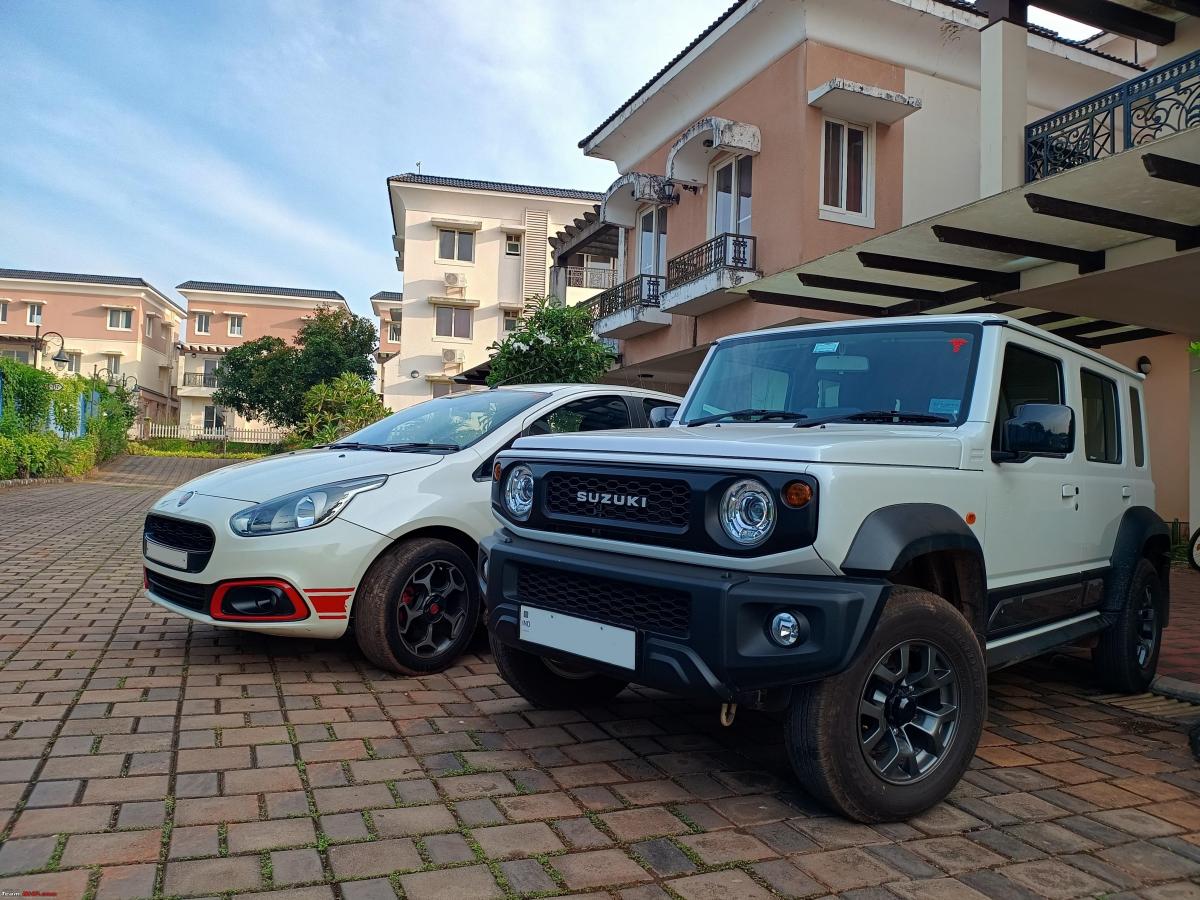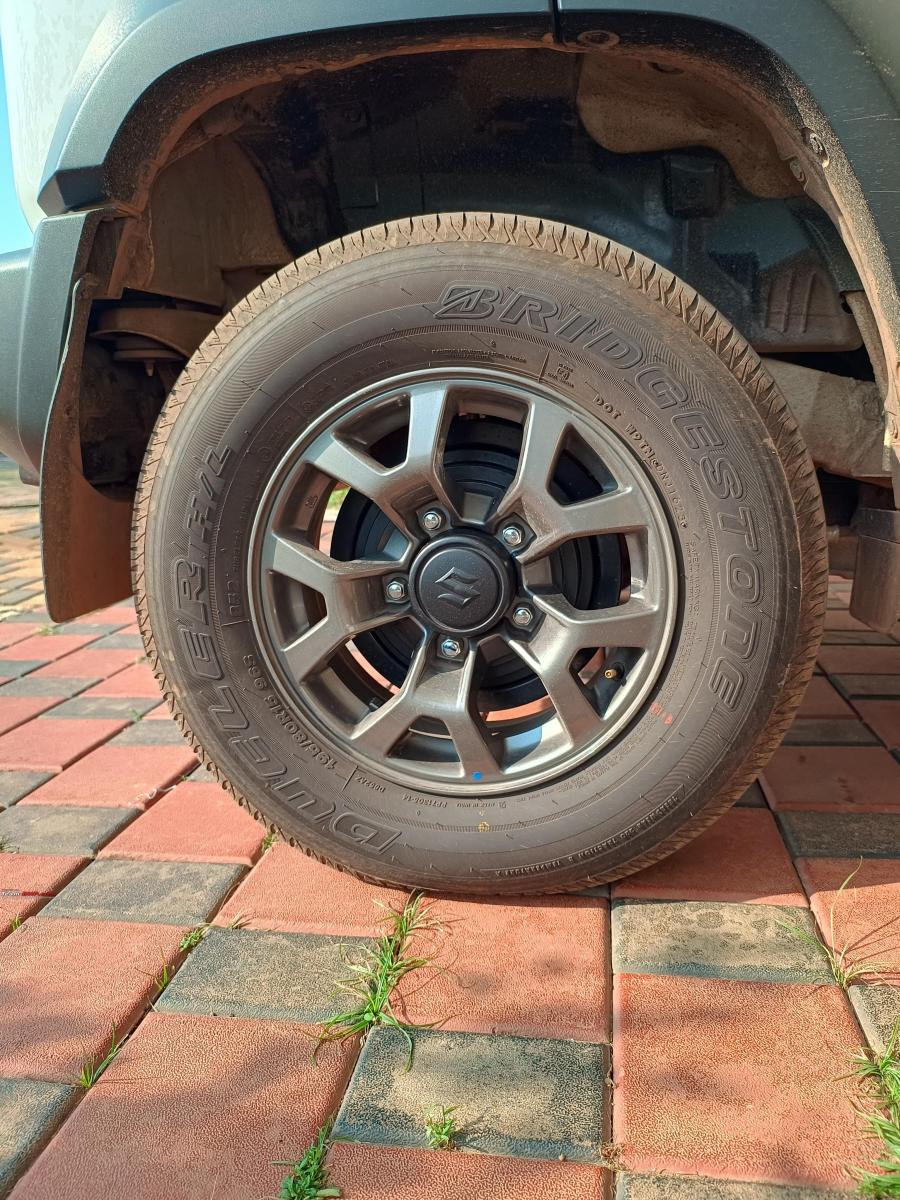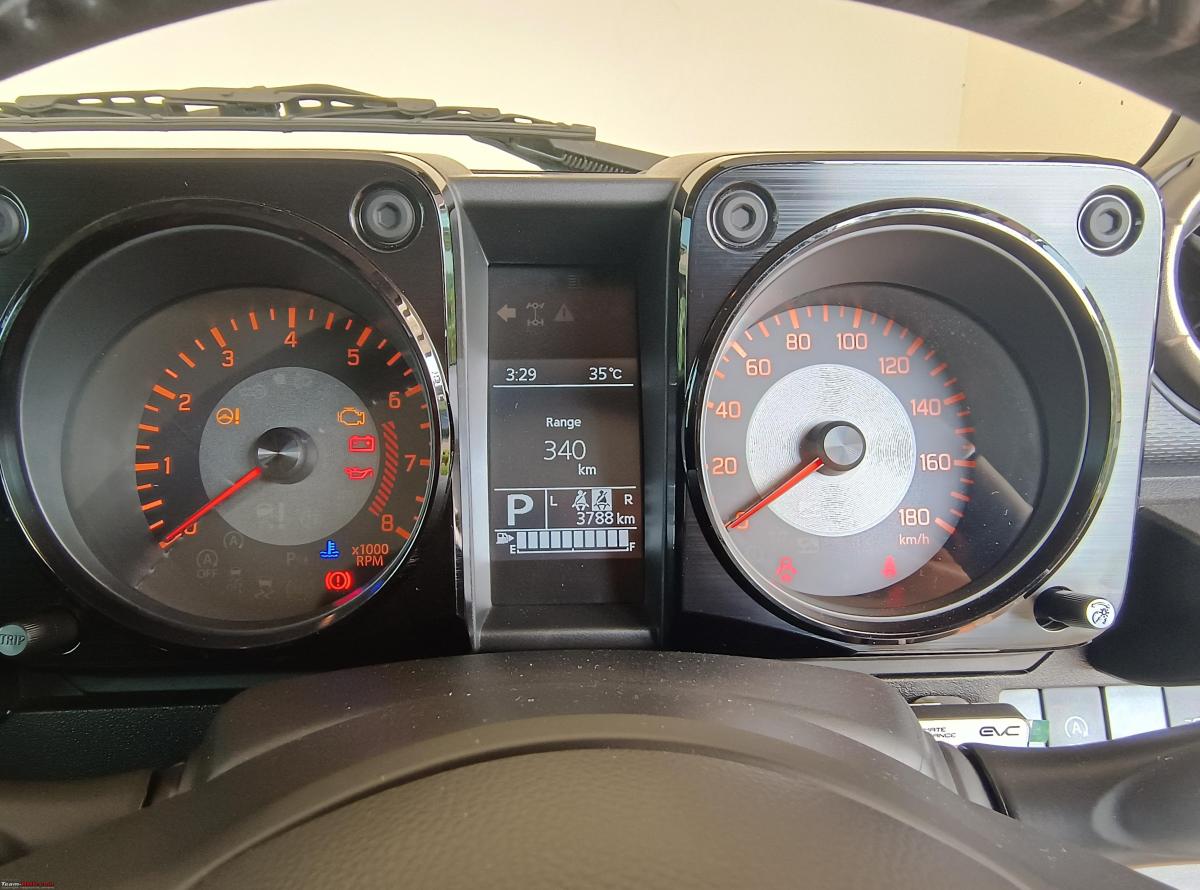From what I see, the looks are polarizing – you see an admiring gleam in the eyes from Gypsy fantasists or a sad nod from the Thar dreamers.
BHPian CogWheel recently shared this with other enthusiasts.
A Japanese Samurai joins the Italian Drama Queen
THREE LINE STORY
The Jimny, a small but true SUV joins the Abarth Punto, adding more character to our garage. The small, clever, agile car is competent and comfortable for city rides as well as for road trips. It can keep you happy as long as you understand its “kei” heritage.
THE CAR
- Maruti Suzuki Jimny Alpha AT Petrol.
- Manufacture Date: October 2023.
- Purchase date: 05 September 2023.
- Purchased at: Nexa Mandovi – Airport Road., Mangaluru.
USE CASE
We live in a Tier 2 city (KA19) with moderate traffic, mildly hilly terrain and a mix of good and broken roads. Car is used 3 to 4 days a week for inner city / suburban rides and occasional long road trips. Most of the times, its my wife and/or I who use the car. Our teenage son joins us on weekend rides. When my elderly parents ride with us, we use a Ciaz.
WHAT WE LIKE ABOUT THE CAR
- Small footprint, great for city use.
- Superb ride quality that lets us fearlessly plough through broken roads.
- The drivetrain, ground clearance and overall ruggedness that gives us a “go anywhere” confidence.
- The six airbags and other safety equipment.
- Comfortable front seats.
- The efficient air conditioning.
- Optimal amount of “gadgetry” – very functional, wireless android auto supported ICE.
- The retro look and feel.
WHAT WE DISLIKE ABOUT THE CAR
- The sensor-less, senseless rear seat belt alarm.
- The rear suspension that tends to thud on breakers at speed.
- The auto-stop feature that forces itself back every time you restart the car.
- The sparse storage conveniences in the cabin.
WHAT WE ARE NEUTRAL ABOUT
- The interior finish quality – could have been better, but acceptable for a car that is utilitarian by design.
- The poor thigh support of the back bench – a trade off with ease of entry-exit, I suppose.
- The tinted window glasses are great to keep the heat out but result in a mildly irritating glare and reflections for the driver at night.
RECOMMENDED FOR
Those looking for an involving, old-schoolish, fun to drive, small, agile SUV that has got its mechanicals right.
NOT FOR
Those looking for a butch, powerful, “big” SUV.
THE REST OF THE REVIEW
Background, booking and delivery.
The Jimny joins an Abarth Punto (see ownership thread here (Owning a Fiat Abarth Punto – A car with character. EDIT : 50,000 km completed!)) in our garage and a Maruti Ciaz that I get to use from the office. This is our first SUV, with all our previous cars being either hatchbacks or sedans. The Jimny replaces a Jetta Highline DSG (Chalk and Cheese?!). By the way, this is our second rear-wheel drive, the earlier one was the inimitable Nano. We have wanted a SUV for some time now, though we do not really need one. Other than some ground clearance, I do not see what the multitude of pseudo-SUVs bring to the table compared to a hatch or a sedan. Hence, for me, if it was an SUV, it had to be AWD / 4WD and, frankly, for the budget that we had in mind, there was no other option. We had looked at the Thar earlier and felt it was a little too impractical and I do not care much for the macho looks. My wife and son though, preferred the looks of the Thar but agreed that the Jimny was more practical and comfortable to ride in.
We booked the car in the third week of January 2023, in the same month it was announced at the Delhi Auto Expo. We were not in a hurry, hence did not really follow up much on it.
We took two longish test drives – the first one on a manual and the second on a AT – in the month of July 2023. The first test drive was a bit of an adventure. While we had just commenced a U-turn at a divider break manned by a traffic cop, we were rammed, by a recklessly driven ambulance. The Innova Ambulance, which, by the way, was not on patient service, hit us on the rear right corner. The Jimny tilted for a few seconds on its left wheels, with the right wheels in the air, before settling back. Damage was limited to the rear bumper and right taillight. All of us were strapped in and remained safe.
The second test drive in a AT variant was longer through more varied roads and we liked what we saw and experienced. It was then that we decided to continue with our booking.
I was allowed a detailed PDI when the car arrived at the dealer. I found no issues and I completed the payment. The insurance quote for a Iffco-Tokio policy from Maruti’s in-house brokering house was not substantially different from those from outside and I decided to go along with them. The dealership had a bundled accessories pack of around Rs.10,000, but they were flexible about what I could include in it. I ordered for mud flaps, all-weather mats including one for the boot and body side claddings. These were fitted at the time of delivery. Registration was completed within two working days.
The delivery experience was smooth and uncomplicated. We are not into ceremonies and fanfare. So, the delivery process was essentially signing of papers and handing over the keys. He sales exec provided a quick walk-through of features, but we ended it quickly as I knew enough about the car thanks to TBHP.
The HSRP plates were not available at the time of delivery. I was asked to come for them a couple of days later for them. I drove to the dealership for them two days later, on a Saturday afternoon, after confirming an appointment on phone. After waiting for an hour, I was told that they could not find the plates! Was a little miffed at this as I had check on phone before leaving for the dealership. They said they would call me back once they found them. It was a week later that they finally found them. It turns out that my plates were inadvertently left in the boot of a Fronx which was delivered subsequently! The plates were finally fixed, but the windshield sticker was missing. That took another week.
History and lineage
The evolution of the Jimny (Source: WikiCommons)
Much has been written about the origin of Suzuki’s compact 4WD SUV. The LJ10 introduced in Japan as a Kei off-roader in 1970 is the earliest direct ancestor of the current day Jimny. This car was based on the ON360, a compact 4WD which was being made by a small Japanese car maker HopeStar in 1967. Suzuki acquired the rights to the ON360, replaced its Mitsubishi 359 cc 21bhp engine with their own two cylinder, two-stroke, air-cooled 359cc Suzuki FB engine which produced 25 bhp. By placing the spare wheel within the body, behind the front passenger seat, Suzuki was able to limit the length of the car to 3 metres, thus meeting the Kei car segment restrictions.
The Hopestar ON360 – the donor car for the first generation Jimny
Source
The ON360 in turn is said to have been inspired by the Steyr-Puch Haflinger – small, 4×4 body-on-frame, high riding off-roaders built and sold by the Austrian manufacturer Steyr-Daimler-Puch in 1960s and 70s.
Steyr-Puch Haflinger – The all terrain vehicle which was in some ways the inspiration for the Hopestar ON360
Source
The Kei cars are micro-cars with body size and engine capacity restrictions that were initially promoted by the Japanese governments to make available affordable, efficient and utilitarian cars to the Japanese people during the economically challenging post World War II times. Starting from a 2.8m x 1.0m x 2.0m size (LxBxH) and 150cc engine capacity limits in 1949, the Kei car category in Japan now permits up to 3.4m x 1.48m x 2.0m sized cars with 660cc engines (up to 63 bhp) to enjoy tax and insurance benefits. Though the tax incentives in Japan have reduced substantially since 2014, Kei cars have become a part of Japanese car culture and continue to enjoy popularity. Many best-selling cars of Maruti Suzuki in India such as the Maruti 800, Alto and the WagonR were derived from the Kei cars of Japan
The Jimny starting from the first generation LJ10 (1970) has evolved through a second generation (the 1981 SJ30 and related models), a third generation (the 1998 JB23 and its derivatives) to the current day fourth generation (JB64 / JB74) models. To this day, there is a Kei variant of the Jimny (JB64) which is sold in Japan. The Jimny Kei cars have been modified to varying extents suit export markets, but at heart they remain true to the Kei philosophy – small, efficient and utilitarian. A long wheelbase variant of the second generation Jimny SJ-410 was manufactured and sold from in India from 1985 to 2018 by Maruti as the Gypsy which gained popularity in hilly terrains, estates and farmlands as well as in the armed forces. It remains a darling on this forum
Though the Gurgaon plant of Maruti Suzuki has been assembling the fourth generation 3-door Jimny (JB74) since 2021 for export to African and Middle East, India had to wait until 2023 to see a successor to the Gypsy on its roads. A 5-door version of the JB74, with an extended wheelbase, was launched for the Indian Market in January 2023 with deliveries beginning in June 2023. As of October 2023, the 5-door version is being exclusively manufactured in India and is being exported to South Africa, Middle East and Latin America with sales outside India expected to begin in 2024
Exterior
The 5-door Jimny does a good job of stretching the length of the JB74 without compromising too much on the proportions that give the Jimmy its unique charm. The Gen 4 Jimny is in some ways more like the 1st and 2nd generation Jimnys (LJ10 & SJ30) than the predecessor 3rd Gen JB23 was. The design language of boxiness, short overhangs and high stance makes it readily recognizable and relatable to the iconic image that the Jimny has built for itself over the last five decades. This is one SUV that does not look butch or macho in a way a Thar (Wrangler) or the Bronco does but exudes a rugged yet non-intimidating charm.
Non-intimidating charmer
The Alpha variant of the car comes with handsome looking alloy wheels shod with 195/80/15R Bridgestone Duelers. I have decided to run stock tyres and they actually have turned out to be good.
Stock 195/80/15R Bridgestone Duelers
Interiors, ergonomics and conveniences
The squared twin-pod instrument console with round analog dials harks back to the SJ-410 Gypsy, complete with the amber backlighting. What’s new is the digital MID in the middle of the speedometer and the tachometer. The MID covers most of the necessary and useful functions including date & time, range, odo, instantaneous and average mileage, average speed and drive time for two trip meters. The MID can be scrolled through and set using two positively old-fashioned stalks sticking out near the bottom of the cluster. Thankfully, the MID display can also be scrolled through using a steering mounted button.
Retro done right!
The interiors are average. The plastics hard, textured and appear more scratch prone than they actually are. No soft touches or alternate materials anywhere on the dashboard or door pads. The grab handle on the dashboard for the passenger is a nice touch. The glove box is smallish, but the available space is deep and usable. The front door pads, as has been pointed out, have just a two-inch slit for storage. The only use I could find for them is to tuck in a neatly folded microfibre cloth or two. The rear door pads don’t even pretend to offer storage. Two cup / bottle holders in the centre console, behind the hand brake lever, and a horizontal space below the switch gear are all that you get for putting away your phone, wallet, key fob and other such things. Thankfully, there are well designed after-market accessories available that come to the rescue here.
The microfibre holder!
The SmartPlay Pro+ Infotainment system with the 9 inch display is smooth and loaded in terms of features but is let down by the average speakers. I am no audiophile and the system meets our needs reasonably well for now. Sometime in the future, I hope to add a DSP and better speakers that this head unit deserves. The Android Auto connectivity is seamless (at least with my Moto Edge 40) and is a big step up from the dinosaur era systems that I am used to in the Mark 5 Jetta (which did not even have Bluetooth!) and the Daichi sourced single DIN unit of my Abarth Punto.
The front seats are comfortable for us (I am 5’10” and my wife 5’4”). The seat fabric feels good. I can find a comfortable driving position despite the lack of seat eight adjustment. The rear bench is as narrow as the one in the Punto but feels more accommodating probably because of the straighter seating. Knee room and leg space are strictly average.
The air conditioner is a winner. Chills in no time and we do not miss a rear AC vent much.
Push Start engine switch, keyless entry, cruise control, climate control and dark green tinted glasses add touches of convenience.
Engine
The naturally aspirated 1462cc in-line four-cylinder, 16 valve petrol engine that generates 103bhp peak power at 6000rpm and 134NM torque at 4000rpm is the same motor that does duty on the Brezza, Baleno, Ciaz, Ertiga, XL6, Urban cruiser and the Belta. However, unlike in these other cars, the powertrain is mounted longitudinally in the Jimny. I have driven the Ciaz for a bit and I can say this – though the engine is the same and are probably tuned similarly, it feels less responsive in the Jimny. This doesn’t mean that it feels powerful in the Ciaz – no, it does not – but relatively, it feels more responsive in the sedan. The reasons for this are the differences in the weight, the additional frictional loss through the rear wheel drive propshaft and transfer cases and also, possibly a different throttle mapping. The engine is adequate and chugs along with good low speed driveability. It’s the top end that that is expectedly underwhelming. The engine, being in use in several cars for a long time, is well tested for reliability. Spares availability is likely to assured for some time to come and should be easy to service.
The ubiquitous K15B in a longitudinal orientation
Drivetrain
The engine is mated to a 4-speed torque converter auto gear box. The gearbox is O-L-D but surprisingly good at what it does. Shifts are real smooth. You will, no doubt, sometimes wait for and hope for a fifth gear when trying to make use of empty stretches on highways, but it does very well in city driving and in relaxed cruising on highways. The overdrive-off option provided by a well-placed button on the shift lever, lets you quickly downshift for dropping into the power band for quick maneuvers. Once you learn to use this, you feel much more comfortable on the highways. I am told that this gearbox is super reliable and if it comes to a worst-case scenario, will be much more affordable to replace than the infamous DCTs.
The off-road capability of the Jimny comes from its manually selectable part-time 4 wheel drive mechanism. The 4WD can be engaged in two ratios – a high and a low – with the speed halving and torque doubling with a shift from high to low. The default drive state is a rear wheel drive. Given the lack of a centre differential, the 4WD is meant to be used only in low-traction surfaces. The brake limited slip differential adds the “Pro” element to Suzuki’s AllGrip drivetrain.
Suspension
The body-on-frame Jimny rides on 3-link rigid axle type suspension with coil springs on both the front and the rear. The old-school solid axle set up is great for off-road terrain. The coil springs which replace the leaf springs of the Gypsy bring in a great degree of comfort to on-road drives. While I don’t fully understand how all this works, I can vouch that it feels great over broken roads. Body roll is felt, it’s after all, a tallish, soft sprung car, but you can maintain sensible speeds along curves.
Steering
The recirculating ball type steering mechanism sets apart the Jimny from the other cars which mostly use a rack and pinion set up. What this means is that the steering feels a little imprecise compared to the others. It also translates into a turning radius that is a bit large for a car of this size.
Brakes
With discs at the front and drums at the rear, the Jimny’s brakes are competent but feel a bit wooden. Coming from the Abarth’s exceptional brake feel, it takes some getting used to. I haven’t had an opportunity to really test those brakes (thankfully), so will reserve my judgement.
Safety features
ABS, EBD, ESP, Brake assist, hill hold and hill descent control, isofix mounts and six air bags tick most of the safety boxes expected of a modern car. The long wheelbase Jimmy is as of now untested for crash worthiness. The car feels solidly built and fells planted and safe when driven within the envelope for a high centre of gravity body-on-frame utility vehicle.
Driving impressions
Other than the daily city drives, we have done an 850 km road trip which included two-lane / four-lane highways, twisties with hairpin bends, narrow city village roads and broken or unpaved roads. The engine, while obviously not a powerhouse, is competent and very well mated to the 4-speed auto tranny. The shifts are smooth and most of the time appropriate. Its quite at home in the city roads with its compact dimensions and maneuverability. Compared to the amazingly alive and responsive hydraulic steering of the Abarth Punto, the Jimny’s EPS unit is relatively limp and lifeless. But then that’s an unfair comparison. I find the EPS unit to be well tuned by Maruti standards. It’s a little on the heavier side, which is befitting of a body-on-frame SUV. Compared to the Ciaz, its Maruti stable mate, I feel it is better weighted, though less precise. I wouldn’t describe it as “floaty”, but then, neither would I attempt carving corners with it at speeds. The centre-return is not as bad as I expected! I find it to be tad better than the 2022 Ciaz which in turn is better than many other small Maruti cars. I find the turning radius to be a bit larger than that of the Jetta that I used to drive earlier and that was more than 2 feet longer! But then, the wheelbase of the Jimny is just 2% lesser than the Jetta’s. The Jimny may be short in length but has a relatively long wheelbase. So, the turning radius should not be as much a surprise as it is made out to be.
In the open roads, the jimny cruises comfortably at around legal speeds. You can maintain good speeds, and with some sensible driving, one can easily keep up with Google Maps predicted ETAs. Once you get used to leveraging the well-placed overdrive off-button, overtaking is not much of a hassle – as long as your expectations and judgement are realistic. The engine and drive train will make themselves heard at speeds as the RPM builds up in the fourth gear. The whine from the transfer cases adds a unique tone to the engine sound.
The ride quality is great. It gives you great confidence especially on broken roads. The rear though, tends to thud on speed-breakers or deeper potholes.
I have used the 4WD mode on a couple of occasions. The Jimny made the steep climb up a wet, slippery, wet mud road look easy-peasy – the same road on which I had beached a Manza a few years ago.
The Jimny aces the track that had beached the Manza
The boot is usable – we found enough space and some to spare, with bags packed for three of us for three days.
The boot – Small, but big enough?
We have added a few accessories to the Jimny which is a great platform for mods:
1. A more retro looking all black grille with the Suzuki name plate. This replaces the stock grille with vertical slats.
2. Side body claddings.
3. Storage tray on the centre console.
4. A phone + bottle holder on the dashboard grab handle.
5. Windshield heater cable cover.
6. A seat back organizer for adding storage options especially for road trips.
7. “7D” Mats
8. Dashcam – DDPAI Mini 5
Continue reading BHPian CogWheel’s review for more insights and information.
Source: Read Full Article











